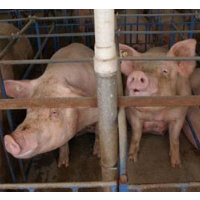Chinese Bid to Buy Largest U.S. Slaughterhouse Company

Is the U.S. becoming a vast hog factory farm for China? Will Smithfield hams still be considered a traditional bit of Americana when the company is owned by a Chinese multinational? These questions and more arise from last week's announcement that Smithfield Foods, Inc. (2012 revenues: $13.1 billion) is being acquired by Shuanghui International Holdings, Ltd., (2012 revenues: $6.24 billion) of Shanghai, subject to U.S. Government approval. With a price tag of $4.7 billion, the deal is the largest ever takeover of an American company by a Chinese one. Shuanghui will take the company private.
However, there is another American component in the deal because one of the investors in Shuanghui is Goldman Sachs, which bought out the Chinese government’s share of the company in 2006. Goldman now owns 5% of Shuanghui, while the Chinese private equity firm CDH Investments, known as the “Chinese Blackstone,” owns 34%. Morgan Stanley is also said to be involved in the current deal.
Although the U.S. imported 4.1 billion pounds of food products from China last year, the Smithfield deal will involve trade in the opposite direction, as China needs ever more pork to feed its 1.3 billion people. In fact, China is not permitted to export fresh pork or beef to the U.S. because it still has outbreaks of hoof and mouth disease.
Nevertheless, critics express worry over food safety. “No one can deny the unsafe tactics used by some Chinese food companies,” noted Sen. Charles Grassley (R-Iowa), who urged a thorough review of the transaction. “To have a Chinese food company control a major U.S. meat supplier without shareholder accountability is a bit concerning.” In 2011, Shuanghui got caught selling pork treated with clenbuterol, a veterinary medicine banned for use in animals intended for human consumption.
Nevertheless, James Roth, director of The Center for Food Security and Public Health at Iowa State University, dismissed food safety concerns because any pork processed in the U.S. would be inspected here. “They’re doing this to enhance exports to China because they need safe meat for their population, not to bring Chinese pork to the United States,” said Roth.
Local concerns predominate in Virginia, especially in the small town of Smithfield itself. Although the deal purports to leave intact Smithfield’s management, workforce and longtime presence in Virginia,
Smithfield Mayor Carter Williams expressed concerns about the future. “I don’t like to see it,” he said. “I don’t think a lot of people do. We’re a little hometown place here.”
But Todd Haymore, Virginia’s secretary of agriculture and forestry, called the deal “a really good thing,” explaining that because “China represents the grand prize, as far as pork exports are concerned,” Smithfield’s access to China could lead to economic opportunities, especially for hog farmers and for the Port of Virginia, from which pork will be exported.
-Matt Bewig
To Learn More:
Chinese Bid for U.S. Pork Had Links to Wall Street (by David Barboza, New York Times)
China’s Food Deal Extends Its Reach, Already Mighty (by Stephanie Strom, New York Times)
Smithfield Foods to be bought by Chinese firm Shuanghui International (by Howard Schneider and Brady Dennis, Washington Post)
Needing Pork, China Is to Buy a U.S. Supplier (by Michael J. De La Merced and David Barboza, New York Times)
Jury Orders Hog Farm to Pay Locals $11 Million for Foul Odors (by Noel Brinkerhoff, AllGov)
Pork Plant Workers Win Union Contract after 17-Year Fight (by Jacquelyn Lickness, AllGov)
- Top Stories
- Unusual News
- Where is the Money Going?
- Controversies
- U.S. and the World
- Appointments and Resignations
- Latest News
- Musk and Trump Fire Members of Congress
- Trump Calls for Violent Street Demonstrations Against Himself
- Trump Changes Name of Republican Party
- The 2024 Election By the Numbers
- Bashar al-Assad—The Fall of a Rabid AntiSemite






Comments